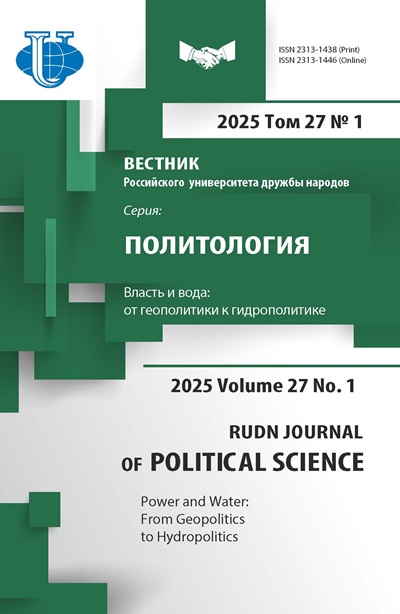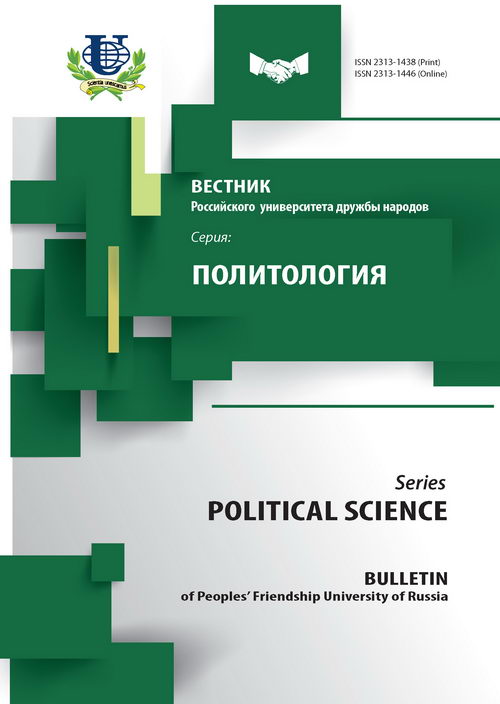No 1 (2016)
- Year: 2016
- Articles: 11
- URL: https://journals.rudn.ru/political-science/issue/view/556
- DOI: https://doi.org/10.22363/2313-1438-2016-1
Full Issue
ARTICLES and REVIEWS
 7-15
7-15


Evaluation of Russian Public Diplomacy Efficiency on the Background of Socio-political Tensions in Armenia
Abstract
The article is dedicated to the analysis of the efficiency of the Russian public diplomacy in Armenia. The article particularly analyzes the efficiency of public diplomacy and soft power of Russia in Armenia during the period of mass protests in June 2015. The research is based on the elements of comparative analysis. The author compares Russian public diplomacy in Armenia with the public diplomacy of the USA, mentioning the main faults of Russian public diplomacy along with some recommendations on how to resolve them.
 16-24
16-24


The Influence of Motivation of Public Officials on their Corrupt Behavior in the System of Public Authority
Abstract
The article analyzes the influence of motivation of public officials on their corrupt behavior. In the framework of normative-value conceptualization corruption is considered as anti-social, auto-destructive deviant behavior. The represented two-dimensional curve of motivation consists of two segments. The first, “thirst for recognition” segment consists of pro-social, positive and altruistic motives, and the second, “greed” segment consists of negative and selfish motives. This article shows that motivation, especially with external locus of control has a decisive influence on corrupt behavior as means of the goals achievement. Particularly, it directly allows public officials to use “aim justifies the means” principle, or indirectly predetermine the very aim of their actions.
 25-35
25-35


Heterarchy in a System of State and Society Cooperation on the Example of Social Policy in Moscow: Introduction of the Concept and Methodological Aspects
Abstract
This paper aims at reviewing the connection between the network structures and hierarchies in contemporary public policy of the Russian Federation, based on the theoretical and practical experience of the policy network concept. It’s based on the hypothesis that the current political system of Russia has a number of issues that are not possible to solve with the help of only social networking, or only administrative resource. The situation indicates the need a hybrid strategy of cooperation between state and civil society and the introduction of the heterarchy concept as a form of governance and political decision-making. The article examines the interactions between the network of foster families and community councils with the Department of Social Protection of Moscow as an example of heterarchy.
 36-47
36-47


System Approach: Evolution and Its Applicability in Contemporary Political Theory
Abstract
In this article, the author examines the evolution and the current state of systems approach in political science. The paper justifies the need of rethinking systems approach. The principal part of this work is devoted to utilization of the systems approach in papers of T. Parsons, D. Easton and G. Almond. The author highlights some distinctions between the terms “systems approach” and “systems analysis”.
 48-57
48-57


Theoretical Approaches to Studying Political Actors’ Career Trajectories by the Example of the Fifth and Sixth State Duma Deputies from the «Just Russia» Party
Abstract
Two approaches to studying political actors’ career trajectories are represented in this article. Using the career approach, the author analyzes career trajectories of the fifth and sixth State Duma deputies from the «Just Russia» party to understand transformation of the spoiler party composition since its foundation. It is revealed that there are no systemic factors of deputies’ recruiting, however there are several channels of recruiting and models of career trajectories after leaving the State Duma. It is demonstrated that these channels and models differentiate from each other in the fifth and sixth convocations.
 58-69
58-69


Political-philosophical Analysis of Power in Russian Political Thought of the Second Half of XIX - First Third of XX Centuries
Abstract
The paper does research of political-philosophical analysis of the problem of power in Russian public thought of the second half XIX - the first third XX centuries. The analysis of the problem of power in this period was realized in channel of three directions: conservatism, liberalism and radicalism. Conservatism considers monarchy as the most acceptable form of power for Russia, liberalism - parliamentary republic, radicalism - peoples’ dictatorship. The relation to democracy of the first and third direction was negative, but the second direction had positive relation to democracy.
 70-88
70-88


From Parliamentary to “Guided Democracy”: the Case of Indonesia
Abstract
This article is devoted to analysis of historical practice of parliamentary democracy in Indonesia. The country as the former of the Netherlands's colony has applied political system of Western countries (parliamentary democracy). The failure of consolidation of parliamentary democracy has leaded the country to Sukarno's political rule of authoritarian “guided democracy” and power transition to military authoritarian regime of Suharto.
 89-98
89-98


Migration Crisis in the EU and Rethinking of Multiculturalism. The Papers of the “Round Table” Conference of the Lecturers and Students of the Peoples’ Friendship University of Russia
Abstract
The paper dedicated to the “round-table” conference “Migration crisis in the EU and rethinking of multiculturalism: the European question and the German answer” which was organized by the Department of comparative politics of the Peoples` Friendship University of Russia (PFUR) and held on October 9 2015 on the faculty of the humanities and social sciences. Among the participants of the conference were the lecturers and the students of the PFUR.
 99-119
99-119


 120-122
120-122


On Our Authors
 123-124
123-124
















